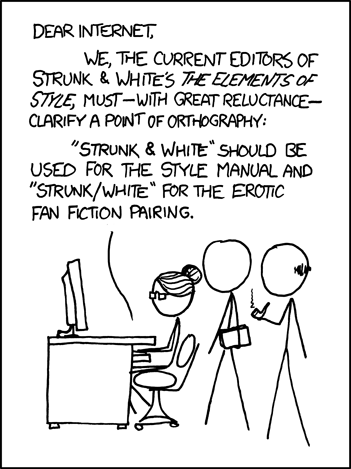This factoid came up in one of my non-linguistics classes last week and this seems like a good place to talk about it:
Babies are born able to make every sound in any human language, but lose this ability as they learn their native language.
I didn't say anything at the time. I've learned by experience that it's usually not worth it to correct a professor and, in this context, the mistake is harmless anyway. I just thought it would be something interesting to write about this week.
When you think about this (especially if you've tried to talk to a toddler) it doesn't make sense. If it were true, then we would see babies make all sorts of wild noises and their parents wouldn't know where all these clicks and strange vowels came from. Instead, babies go through defined stages where they experiment with sounds. Further proof is all of those kids who have to see speech therapists in elementary school. Many of them have trouble producing an /r/ and have to be taught how to make the sound. Otherwise, most of those kids are just as articulate as any of their peers.
The real fact is this:
When babies are born, they are able to distinguish every sound in any human language, but they lose this ability as they learn their native language.
So, babies can distinguish between very similar sounds that an adult wouldn't necessarily hear. For example, I taught ESL to a group of ladies whose native language didn't have a "th" sound. Instead, they would make an "f" sound. They couldn't even hear the difference until I pointed it out and practiced with them because never before in their lives did they need to make two distinct sounds. Because they are trying to learn English later in life, they will probably always struggle to make that distinction. In contrast one of them had a young granddaughter who was born in the US. That little girl will not have trouble making a distinction between the two sounds because she will learn English while she still has an innate ability to hear the difference.
So, how do we ask babies who can't talk if they think two sounds are different? The method I've seen involves a binky attached to a computer. When a baby hears the same sound over and over again, he or she will suck the binky in a relaxed, rhythmic way. But, if the sound changes, the baby reacts by sucking faster. In other words, the baby is reacting to the new stimulus. So, while an adult may not hear the difference between two similar sounds, a baby will react to the difference.
So, next time, impress your friends by getting this fun fact right.
Babies are born able to make every sound in any human language, but lose this ability as they learn their native language.
I didn't say anything at the time. I've learned by experience that it's usually not worth it to correct a professor and, in this context, the mistake is harmless anyway. I just thought it would be something interesting to write about this week.
When you think about this (especially if you've tried to talk to a toddler) it doesn't make sense. If it were true, then we would see babies make all sorts of wild noises and their parents wouldn't know where all these clicks and strange vowels came from. Instead, babies go through defined stages where they experiment with sounds. Further proof is all of those kids who have to see speech therapists in elementary school. Many of them have trouble producing an /r/ and have to be taught how to make the sound. Otherwise, most of those kids are just as articulate as any of their peers.
The real fact is this:
When babies are born, they are able to distinguish every sound in any human language, but they lose this ability as they learn their native language.
So, babies can distinguish between very similar sounds that an adult wouldn't necessarily hear. For example, I taught ESL to a group of ladies whose native language didn't have a "th" sound. Instead, they would make an "f" sound. They couldn't even hear the difference until I pointed it out and practiced with them because never before in their lives did they need to make two distinct sounds. Because they are trying to learn English later in life, they will probably always struggle to make that distinction. In contrast one of them had a young granddaughter who was born in the US. That little girl will not have trouble making a distinction between the two sounds because she will learn English while she still has an innate ability to hear the difference.
So, how do we ask babies who can't talk if they think two sounds are different? The method I've seen involves a binky attached to a computer. When a baby hears the same sound over and over again, he or she will suck the binky in a relaxed, rhythmic way. But, if the sound changes, the baby reacts by sucking faster. In other words, the baby is reacting to the new stimulus. So, while an adult may not hear the difference between two similar sounds, a baby will react to the difference.
So, next time, impress your friends by getting this fun fact right.



